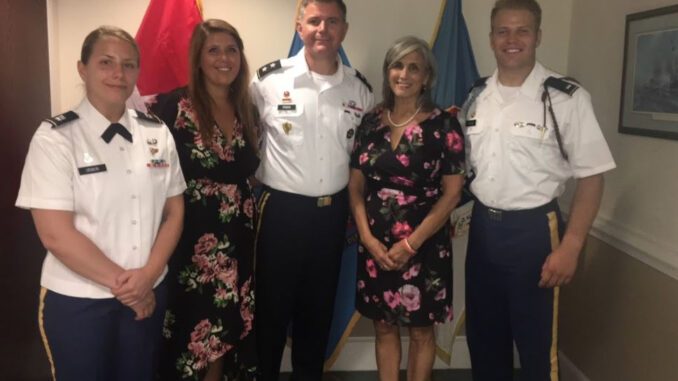
Megan Trotter | News Editor
“[Being a veteran] represents a time when we stood up for something bigger than ourselves,” said Dr. Lewis Irwin, retired Major General for the U.S. Army.
For Irwin, this time spanned 34 years of his life where he served as a commission officer for the Army and Joint assignments. During this time, he was active overseas in Germany, Saudi Arabia, Iraq, Kuwait and Afghanistan.
He grew up in Claysville, Pa. with his younger sister Tracy, before becoming a cadet at the U.S. Military Academy at West Point. Irwin graduated in 1986 and finished his education at Yale University where he received a doctorate in political science as well as a masters in strategic studies from the U.S. Army War College.
While on active duty, Irwin served tours in the 101st Airborne Division, with the 3rd Armored Division during Operation “Desert Storm” and as Sapper company command in the 1st Armored Division in Germany. Irwin also completed faculty service in West Point’s Department of Social Sciences and joint duty with the Combined Security Transition Command-Afghanistan.
During this time he also worked with the Afghan National Police and NATO’s international partners.
Irwin is also Airborne, Air Assault, Sapper and Jungle Warfare qualified, and he holds the Army’s “3H” Joint Planner designation.
In 2000, Irwin decided it was time to transition from active duty to reserve. His wife Marcia was also from Western Pa., so the two planned to relocate back to the area. Irwin started a position as a tenure track professor for Duquesne’s Department of Political Science right before the 9/11 terrorist attack took place.
“Now, suddenly, we became operational. And so I was in a position, and Duquesne was very supportive of this, but I was in a position to be able to contribute to [the] global war on terror and help in the aftermath of 9/11,” he said.
Irwin found himself split between worlds — no longer being able to deemphasize the military and fully focus on teaching.
“[It] actually ended up being a balance between both careers,” he said. both careers,” he said.
Irwin’s military awards include the Distinguished Service Medal, Defense Superior Service Medal, Legion of Merit and two Bronze Star Medals.
“[Distinguished Service Medal] is a very senior award, and that was for a high level command. I commanded about 12,500 troops across 26 states for 2 ½ years,” Irwin told the Duke. “That experience of working with the tremendous soldiers and being able to build such high, highly effective teams … those are things that have some meaning to me because they reflect times in my life when I really had an opportunity to work with some really special people.”
Duquesne alumnus and army reservist Jon Soltz, who served two tours in Iraq said that Irwin was a huge force that guided him through training as the “new-guy” in ROTC and later on in his military career.
“I feel like maybe sometimes he sees things in people that other people don’t see. And at that moment [in training], I sort of needed somebody to believe in me,” he said. “I always felt like I worked so hard for him because, you know, at some level, he saved me.”
During his time training, Soltz said a lot of cadets looked up to Irwin.
“Most people looked at him like, ‘How did this guy do all of that in that amount of time,’” Soltz said. “We weren’t used to seeing those types of officers show up in ROTC.”
Irwin’s knowledge of politics and warfare have extended beyond serving military purposes. Throughout his civilian career, Iwrin has written four books and several articles about American politics, policy and national security. His newest project looks to analyze the polarization of American politics.
The inspiration for his fifth book comes from thinking back on the past and conflicts, such as the Civil War, that have challenged political disputes without sacrificing American values.
“This actually represents an extension of my service to the country in uniform as I’m looking at some of the political, economic and social challenges that we’re facing as a country,” he said.
Irwin relinquished his position as the commandant of Joint Forces Staff College in 2020 but reflects fondly on the job.
“I was working with all the branches of the military, and it was a really special opportunity. But the Joint Force Development and Design Center was an attempt to bring together all four services, and to think seriously about the future of warfare,” he said.
Irwin continues his legacy through his wife and children, Triss, Eva and Andrew. Triss and Andrew both have served several tours overseas in the Army. Eva currently works as teacher and coach for Alexandria City High School, and Marcia is a nurse at UPMC Mercy.
“What we represent, and what we serve for, what we fought for are things that are genuinely important. And it’s a time when, for better or worse, we put the interests of the people and our values ahead of ourselves, and that’s what being better represents,” Irwin said.
